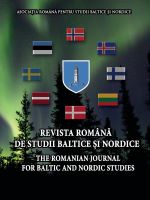Alterity and identity: Romanian-Swedish mutual perceptions during The Second World War
Alterity and identity: Romanian-Swedish mutual perceptions during The Second World War
Author(s): Andreea DahlquistSubject(s): History, Cultural history, Comparative history, Diplomatic history, Economic history, Political history, Social history, Modern Age, Fascism, Nazism and WW II
Published by: Asociatia Romana pentru Studii Baltice si Nordice
Keywords: mutual perception; alterity; Second World War; society; culture; Romania; Sweden;
Summary/Abstract: The geographic distance between Romania and Sweden influenced the creation of mutual imaginary. However, it wasn't until the beginning of the 20th century that inhabitants of the two nations were interested in discovering each other. Therefore, Romanian-Swedish mutual impressions were mostly based on the accounts of tourists who had visited both nations. During the interwar era, direct contact between Romanians and Swedes was infrequent. The news about Romania was disseminated by the Swedish press, which played a significant part in the formation of hostile sentiments. On the other side, the Romanian diplomats who ran the Stockholm-based Legation had nothing but admiration for Swedish society. During the Second World War, the situation improved as more Romanian and Swedish intellectuals traveled to Scandinavia and the Balkans. However, these interactions did not alter how Romanians and Swedes viewed one another.
Journal: Revista Română de Studii Baltice şi Nordice
- Issue Year: 14/2022
- Issue No: 1
- Page Range: 49-72
- Page Count: 24
- Language: English

